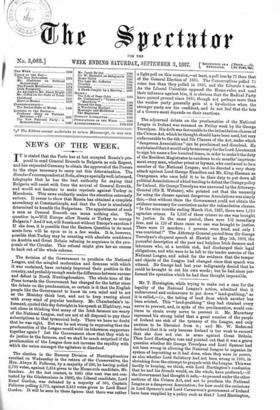The adjourned debate on the proclamation of the National League
in Ireland was resumed on Friday week by Sir George Trevelyan. His drift was favourable to the intimidation clauses of the Crimes Act, which bethought should have been used,but very unfavourable to the 6th and 7th Clauses of the Act, under which " dangerous Associations" can be proclaimed and dissolved. He maintained that it would only be necessary for the Lord-Lientenant to sign his name a few hundred times, in order to makeit the duty of the Resident Magistrates to condemn to six months' imprison- ment every man, whether priest or layman, who continued to be a member of the National League; and he directed a very sharp attack against Lord George Hamilton and Mr. King-Harman as Orangemen who once held it to be their duty to put down all political Associations of akind tending to defeat the Orange policy for Ireland. Sir George Trevelyan was answered by the Attorney. General (Sir R. Webster), who pointed out that the necessity for using the clauses against dangerous Associations was simply thie,—that without them the Government could not obtain the evidence necessary for conviction under the intimidation clauses. "In the nine months ending March 31st, 1887, there were 1,310 agrarian crimes. In 1,103 of these crimes no one was brought to justice. In the same period, there were 132 incendiary fires, and in 126 of these cases no one was brought to justice. There were 11 murders ; 5 persons were tried, and only 1 was convicted !" The Attorney-General quoted from Sir George Trevelyan's eloquent speech at Hawick on May 5th, 1886, the powerful description of the poor and helpless Irish farmers and labourers who, at a terrible risk, had discharged their legal obligations, and who were to be left to the tender mercies of the National League, and asked for the evidence that the temper and objects of the League had changed since that speech was uttered. Sir George had last year indignantly denied that he could be brought to eat his own words ; but he had since per- formed the operation which he had then thought impossible,


































